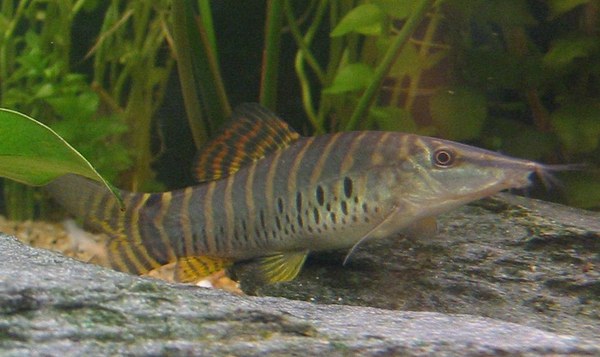Syncrossus helodes
Summary
< Back to "Telling Tigers Apart"
Common name: Banded Tiger loach,
Tiger Botia.
Synonyms: Botia helodes (Suavage, 1876)
Distribution: Vietnam, Thailand, Laos, Cambodia.
Sexual Dimorphism: Mature females probably have a rounder abdomen.
Maximum size: 12 inches.
Similar to: Syncrossus hymenophysa

Care: This species lives in some of the largest
Indochinese rivers. Due to its large adult size, Syncrossus helodes requires a large aquarium.
This should be no less than 4ft long to begin with, and larger quarters will be
required as they grow. The substrate must ideally be fine sand to allow digging
without damage to the barbels. Provide plenty of hiding places in the aquarium
amongst bogwood, caves, and sturdy plants. Subdued lighting is required. Clean, well-aerated
water is a must.
Feeding: Will accept most brands
of dry sinking catfish pellets, but should be offered a variety of frozen foods
to supplement the diet - mosquito larvae and brine-shrimp are usually taken with
much enthusiasm. Larger specimens will take Mysis shrimp, krill and chopped
prawns.
Water parameters: pH: 7.0
or below. Hardness: Soft and slightly acidic is best. dH: <12 degrees.
Temperature: 77ºF to 86ºF
(25-30°C)
Breeding: Not known to have been bred in aquaria.
Notes
 The largest member of the Tiger Botia group, which like it's close relatives, is
aggressive and unsuitable for community aquariums. This species, like other Syncrossus, must be maintained in groups
of 5 or more in order to spread any aggression and to allow the fish to form a
natural hierarchy.
The largest member of the Tiger Botia group, which like it's close relatives, is
aggressive and unsuitable for community aquariums. This species, like other Syncrossus, must be maintained in groups
of 5 or more in order to spread any aggression and to allow the fish to form a
natural hierarchy.
Tankmates must be robust and fast-swimming, for example, some of the more gregarious medium-large sized members of the barb or Danio families. Can be kept with other aggressive loach species such as Syncrossus beauforti, Syncrossus berdmorei, Yasuhikotakia morleti etc.
 Sometimes confused with S. hymenophysa. They can be easily told apart
by the direction of the stripes anterior to the dorsal fin. In S. hymenophysa, the stripes are orientated so
that they start at the dorsal surface with the bottom of the stripes finishing
further forwards towards the front of the fish. In S. helodes, it is the other way around, with
the stripes leaning backwards instead of forwards. S. helodes also has a series of mixed size,
dark oval spots which are vertically orientated in the area between the pectoral
fin and anus. S.helodes also lacks the
dorsal spot found in S. hymenophysa.
Sometimes confused with S. hymenophysa. They can be easily told apart
by the direction of the stripes anterior to the dorsal fin. In S. hymenophysa, the stripes are orientated so
that they start at the dorsal surface with the bottom of the stripes finishing
further forwards towards the front of the fish. In S. helodes, it is the other way around, with
the stripes leaning backwards instead of forwards. S. helodes also has a series of mixed size,
dark oval spots which are vertically orientated in the area between the pectoral
fin and anus. S.helodes also lacks the
dorsal spot found in S. hymenophysa.
Syncrossus helodes loses some of
its young colouration as it matures.
For more information see: Telling Tigers Apart - The Syncrossus Group of Loaches
Photo Gallery
Click to view all images of this species! |
|
Document Actions


